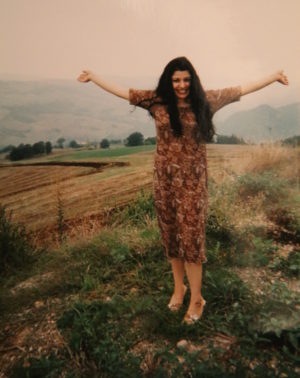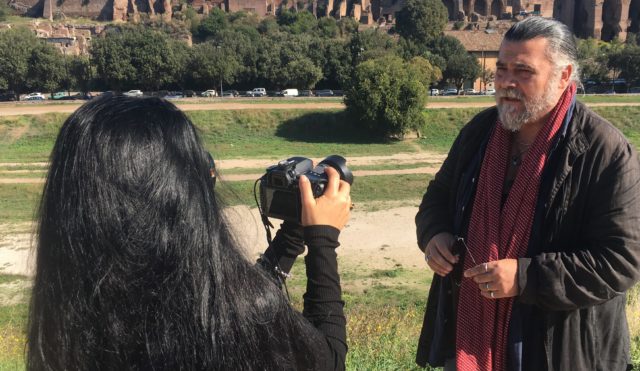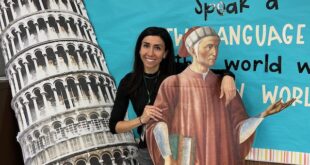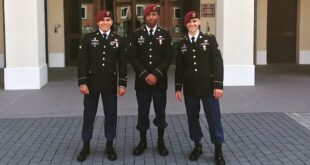An esteemed film critic and now documentary filmmaker, Jeannine Guilyard taps into her professional roots to celebrate her Italian culture.
As Italian Americans, we often play movies in our minds about what life was like back in the homeland for our ancestors. Some of us simply imagine it and others make pilgrimages to villages in search of precious clues. But for Jeannine Guilyard, that movie has taken shape and form as an award-winning documentary, “Return to Lucania.”
Readers of this publication will recognize Guilyard as a longtime contributor and arguably America’s premiere Italian film critic. An Emmy and Peabody Award-winning TV news editor for close to two decades, she has since interviewed nearly every contemporary Italian film actor and director. But making the leap from expert to practitioner is no small feat: Imagine your favorite music critic releasing a lauded album. With the 2018 Award of Excellence from the Prospective Brio Film Festival in Benevento, Italy, under her belt, Guilyard shares with Lou&A her career highlights along with her quest to honor her great-grandparents’ legacy through her hour-long documentary.
L&A: Tell us about your Italian upbringing and heritage.
Jeannine Guilyard: I was born and raised in Rochester, N.Y. We visited my grandparents on the weekends, and I grew up knowing my great-grandmother from Basilicata. She passed away in 1980 when I was 8 years old and I was devastated. I was a fan of the great Italian-American filmmakers — Francis Ford Coppola, Talia Shire, Martin Scorsese and Sylvester Stallone — and my older relatives loved the great Italian filmmakers like Marcello Mastroianni, Sophia Loren, Carlo Ponti and Dino De Laurentiis. They were like extended family.
Lou&A: What inspired your love of film?
JG: I was always curious about my Italian heritage. So in 1996, when I was 24 and a video editor for CNN in San Francisco, I pursued an opportunity to help in the Rome bureau. I took a month-long basic Italian language course, threw all my stuff into storage and got on a plane. It was supposed to last about six weeks, but I ended up staying six months. It was an amazing, life-changing experience. We covered Pope John Paul II’s appendectomy and staked out at the Gemelli hospital all night. Before being admitted, he walked over to our crew and blessed us.
L&A: On returning to the U.S., you began to research Italian film. What was that like?
JG: I began with younger filmmakers who had some success outside Italy, such as Nanni Moretti, Lina Wertmuller, Ornella Muti, Gabrielle Salvatores and Giuseppe Tornatore. Their films were available at rental stores. Then about four years later, after moving to New York City, I was living on the Upper West Side. During a walk, I noticed posters outside Lincoln Center for a contemporary Italian film series called Open Roads: New Italian Cinema. Well, I ended up seeing every film in the series and attending just about every Q&A with the filmmakers.
The films were amazing because many didn’t have huge budgets and were shot in the neighborhoods of the filmmakers. There was a film called “La Capagira” that was shot in Puglia using all non-professional actors. It was like being in Rome again. The sounds of the city streets, the crazy predicaments the characters found themselves in: It seemed a bit like neorealism. The series was a success and became an annual event.
 L&A: Who stands out as a highlight interview?
L&A: Who stands out as a highlight interview?
JG: Director Paolo Genovese, whom we featured in the December 2016 issue, is always a joy to talk to because I can relate to his work. His video editor, Consuelo Catucci, plays a huge role in the final cut of the film and their relationship is similar to that of Martin Scorsese and Thelma Schoonmaker. These directors deeply respect the opinion and judgment of their editors — and perhaps because both editors are women, they add a different perspective to the films.
L&A: What inspired “Return to Lucania”?
JG: “Return to Lucania” is the documentary that I’ve always wanted to see on Basilicata. In 2001, I was working for ABC News when the World Trade Center and Pentagon attacks took place. After working non-stop on Peter Jennings’ special report, I along with others developed a serious lung infection and horrible cough. So when things settled down, I went back to Rochester for a couple weeks to breathe some clean air and get better. While there, I raided my grandmother’s hope chest filled with old pictures and determined to find something of my great-grandmother’s family in Italy. I found a photo of her brother with his town “Rionero In Vulture” written on the back.
I tracked down our not-so-distant cousins in the town and in 2002 visited them. Prior to the trip, I had read that this region of Basilicata was dirt poor and isolated from the rest of Italy. The pictures always depicted old women with missing teeth dressed in black. But when I arrived, I found a modern, bustling region with computers, malls, pizzerias and young people. It was nothing like what the tourist books described. I just chalked it up to America’s obsession with romanticizing Italy as the “Old Country.”
L&A: You started a blog in 2015, “Basilicata: Land of Cinema,” and did a lot of traveling in the region. How did that set the stage for your documentary?
JG: I 100 percent fell in love with the entire region. It was just a beautiful, contemporary dream I wanted to share with as many people as possible. So the following year, I returned with my camera and started interviewing young people who were enthusiastic to talk about their region. Then I stumbled upon the Russo Brothers Italian American Film Forum Grant (via the National Italian American Foundation), which I received to finish the film. After being notified that I was a recipient, I went into full production mode and put an hour-long documentary together in four months! I did everything myself due to time constraints. My background in news editing helped because I’d learned to work efficiently on tight deadlines.
Although it’s not technically perfect because I’m by no means a cinematographer, the message comes across loud and clear: Basilicata is no longer the poor, desolate region our ancestors left 100 years ago. I am so grateful to the Russo Brothers, NIAF and the Italian Sons & Daughters of America for giving the documentary this platform and voice.
L&A: At the end of the day, what aspects of your work have been most rewarding?
JG: Marrying two huge parts of my life — Italy and film — has allowed me to write from the heart. That is all that a writer can ask for. I dedicated the documentary to my great-grandmother because in passing on her southern Italian traditions to my mother, she laid the foundation for my upbringing, values and pride in my Italian origins.
To watch Jeannine Guilyard’s “Return to Lucania,” visit vimeo.com/watch and enter the film’s title in the search window.
The above appears in the March 2019 issue of the print version of Fra Noi. Our gorgeous, monthly magazine contains a veritable feast of news and views, profiles and features, entertainment and culture. To subscribe, click here.
 Fra Noi Embrace Your Inner Italian
Fra Noi Embrace Your Inner Italian







